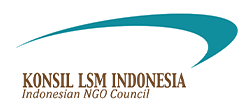1. Recently issue of NGO accountability has garnered exceeding attention and becomes hot topic in various discourses. Undoubtedly it is thanks to the operation of Indonesia NGO Council. In 2011 a number of discussion forums on the accountability of NGOs have been run by NGO communities in Jakarta including Koalisi Masyarakat Sipil untuk Kebebasan Berserikat (KKB) or Civil Society Coalition for Freedom of Association and Yayasan Nurani Dunia. This phenomenon is different from that of in the past, during which the majority of NGOs in Jakarta demonstrated indefferent stance amid the mounting demands voiced by various parties about NGO accountability. Intensive discussions among NGO communities on the need of improving NGO accountability are also the immediate consequence of amendment to Civil Society Organization Law (UU Ormas) that is currently being discussed by the Government and Parliament (DPR).
2. Self-regulation to boost NGO accountability is a method worthy to heed. NGO Council has developed its internal Code of Ethics as the reflection of the said self-regulation. In addition, NGO Council has conducted a preliminary assessment to map the accountability of its members. Lesson learned from and the reflection of this initial effort is that self-regulation within NGO communities is obviously not an easy task. Some Council members expressed their resistance against this relatively new phenomenon for various grounds. Nevertheless, many other members are capable of applying accountability principle. It implies that attempt to foster accountability in future remains a big challenge that must be dealt with by NGOs. In light of that internal governance strengthening within Civil Society Organizations (OMS) should be maintained, especially NGOs in view of their balancing capacity in nurturing the on-going democracy in Indonesia.
3. As an organization advocating NGO accountability, Council must initiate this effort from within. To materialize its aspiration as an accountable organization, Council has developed an on-line complaint resolution mechanism in its website starting from August 2011. Indeed, this website-based mechanism has become one of crucial dimensions of accountability for an organization.
4. Supports of both external and internal parties for the Development of Regional Councils are prerequisites for strong Representatives of Indonesia NGO Council in regions. Council’s Representatives at provincial level have been established in South Sumatra in August 2011. It is planned to set up additional regional Representative in another province. The establishment of this new institution becomes a big challenge for Council, notably in its efforts to optimize the functions and roles of regional Representatives in pursuing the vision and mission of Council including to bolster self-reliance and sustain the existence. Experience in the past showed that many new networks established in regions would be immediately non-active after their funding supports were stopped. Commitment to the mission promoted by Council on top of personnel and institutional capacity in regions must be forthwith reinforced with, among other things, supports from members of Steering Committee domiciled in the province concerned.
Download full report: Narrative Report – The Ford Foundation # 30137 (2011)1. Recently issue of NGO accountability has garnered exceeding attention and becomes hot topic in various discourses. Undoubtedly it is thanks to the operation of Indonesia NGO Council. In 2011 a number of discussion forums on the accountability of NGOs have been run by NGO communities in Jakarta including Koalisi Masyarakat Sipil untuk Kebebasan Berserikat (KKB) or Civil Society Coalition for Freedom of Association and Yayasan Nurani Dunia. This phenomenon is different from that of in the past, during which the majority of NGOs in Jakarta demonstrated indefferent stance amid the mounting demands voiced by various parties about NGO accountability. Intensive discussions among NGO communities on the need of improving NGO accountability are also the immediate consequence of amendment to Civil Society Organization Law (UU Ormas) that is currently being discussed by the Government and Parliament (DPR).
2. Self-regulation to boost NGO accountability is a method worthy to heed. NGO Council has developed its internal Code of Ethics as the reflection of the said self-regulation. In addition, NGO Council has conducted a preliminary assessment to map the accountability of its members. Lesson learned from and the reflection of this initial effort is that self-regulation within NGO communities is obviously not an easy task. Some Council members expressed their resistance against this relatively new phenomenon for various grounds. Nevertheless, many other members are capable of applying accountability principle. It implies that attempt to foster accountability in future remains a big challenge that must be dealt with by NGOs. In light of that internal governance strengthening within Civil Society Organizations (OMS) should be maintained, especially NGOs in view of their balancing capacity in nurturing the on-going democracy in Indonesia.
3. As an organization advocating NGO accountability, Council must initiate this effort from within. To materialize its aspiration as an accountable organization, Council has developed an on-line complaint resolution mechanism in its website starting from August 2011. Indeed, this website-based mechanism has become one of crucial dimensions of accountability for an organization.
4. Supports of both external and internal parties for the Development of Regional Councils are prerequisites for strong Representatives of Indonesia NGO Council in regions. Council’s Representatives at provincial level have been established in South Sumatra in August 2011. It is planned to set up additional regional Representative in another province. The establishment of this new institution becomes a big challenge for Council, notably in its efforts to optimize the functions and roles of regional Representatives in pursuing the vision and mission of Council including to bolster self-reliance and sustain the existence. Experience in the past showed that many new networks established in regions would be immediately non-active after their funding supports were stopped. Commitment to the mission promoted by Council on top of personnel and institutional capacity in regions must be forthwith reinforced with, among other things, supports from members of Steering Committee domiciled in the province concerned.
Download full report: Narrative Report – The Ford Foundation # 30137 (2011)






